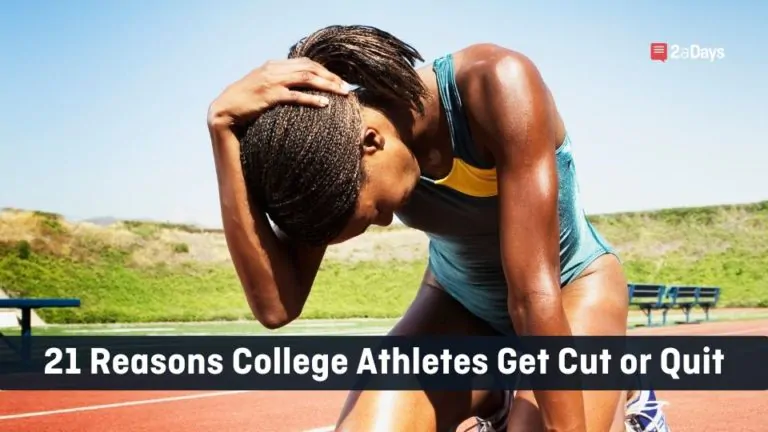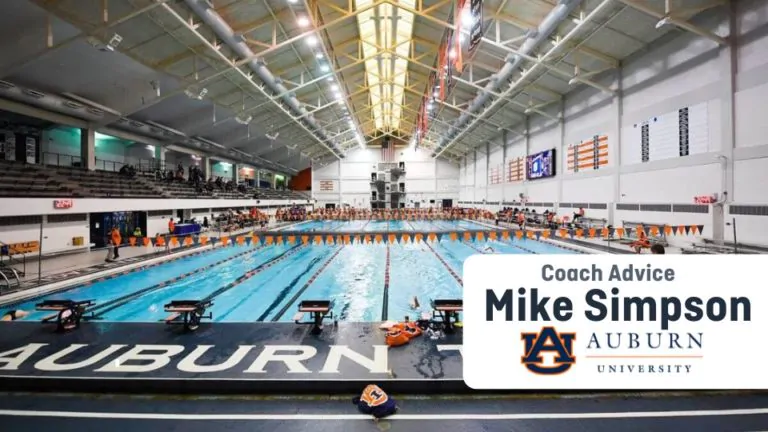College sports can be tough on certain people which may lead to a player quitting or getting cut. College athletics aren't for everyone so they decide to step away from their sport and others just can't maintain a high enough skill to compete. Unfortunately, this may happen and it can be hard on an athlete so don't be afraid to ask for help. Here's why this happens so you can be prepared.
- Not Good Enough
A player may be cut if they're level of play is no longer high enough to compete at the college level. This can be seen more often in Division I athletics since the level of play is so high and the need to win is even higher.
- New Recruits
Some players may be replaced by incoming freshmen and transfers that are better than them. This can be a real blind side for the players who get cut, especially when it's a last-minute commit or transfer from the portal.
Many athletes quit when their playing time is cut. Players become discouraged and embarrassed, especially if they played a lot in high school. If an athlete isn't mentally in the game, then there's a higher chance they will quit if their playing time is affected.
- Passion
When you commit to play a sport in college, your passion to play is at an all time high. This can change though when you actually get to school and start competing. Your life goals may change and you athletes may want to try a new path that doesn't include being on a team. An athlete may just fall out of love for the sport and realize it's no longer for them.
If an athlete starts to lose the want and will to play, it'll affect their competitiveness and performance in practices and games. If a coach sees that their player isn't giving 100% effort at all times, it could lead to that player getting cut and replaced by someone who will.
- Work Ethic
When you're playing a sport in college at any level, you have to be working the entire year. This means that during the offseason, you're still working out and staying in shape and putting in just as much work as you while in season. Many athletes also train on their own to become even better athletes. Some athletes aren't cut out for this and can be replaced if they're not working as hard as others.
- Constant Competition
Competition is a part of college sports at times other than the actual practices and games. You are constantly competing for your playing time and have to earn your spot every year. This may be too much for some athletes.
- Stress
Like we said in the previous point, the competition never ends so if athletes can't handle the stress that comes with that, they may decide to step away. When athletes are stressed and decide to quit they may describe their sport as not fun anymore. There are also other stressors that athletes experience like the struggle of balancing school with athletic commitments.
- Culture Shock
Some athletes go into college athletics expecting it to be like high school or their travel teams. They eventually find out it's a completely different animal. For instance, there often isn't as close of a connection with the head coach and the assistant coaches are who athletes will primarily talk to. The level of competition isn't the same as high school either and knowing you're expendable as an athlete is also something players may not realize until they're there.
Related: How a Different Culture Can Affect Your Athletic Performance
- Drinking & Drugs
At college there are a lot of distractions including drinking and drugs. Not only do these things affect your health, they have consequences that could come with them. Some drugs could be illegal and underage drinking is unacceptable. If an athlete is caught doing any illegal activity they may be suspended or kicked off the team.
Sometimes it's as simple as the athlete doesn't like the college they picked. If an athlete doesn't do their research on the school beforehand and just commits because it was the best offer, chances are they won't have a good experience. This leads to athletes transferring around and many struggle to find a good fit causing them to quit all together.
- Coach
As important it is to research the school, it's also imperative to research your coaches. If your coach doesn't share your ideals it may be hard to build a relationship with them. Remember, an athlete is playing for the coach as well as the school. When you go to visit it's important to ask the coach questions so you can build a better understanding of who they are and how they like to run their program.
Related: Rate your Coaches, Facilities, and Campus Visits
Most schools have a built-in culture that the athletes must be able to fit into. If the athlete's personality and work ethic doesn't fit the mold of the team's culture, it's not going to work out. This is another area you can talk to the coach about and they should be able to give their perspective on the team culture and how the team runs.
- Balancing Academics
As a student athlete you must be able to balance your athletics with your academics. If your academics slip, the coach may have no choice but to sit you or cut you. Athletes must be able to balance both and have good time management skills to ensure that everything they have to get done, gets done and is on time.
- Time Commitment
Some athletes come into college and think that they can handle the time commitment of being a full-time athlete. Unfortunately, college sports aren't for everyone and it's harder for some to stay on top of their work and athletics. For that reason, athletes may decide to quit since it's too much of a workload.
- Home Sickness
Athletes who dominated their sport in high school may come into their college thinking that they'll be able to excel at the next level easily, but the first week of practices can be an eye- opening experience for some. Freshmen soon may realize that they're not as good as they thought and that people are on their playing level too, which can be discouraging.
One of the hardest things for all college students is being away from home for the first time. Athletes may have been raised in a household where family always came first, making it even harder for them to be away from their family and home. Athletes who move across the country and are a plane ride away from their house may feel home sick to an even greater degree.
- Injuries
Depending on the severity of an athlete's injury, it could have long-term impacts. They can become less effective in certain areas of their sport that make it so they aren't as good as they used to be. This can be very discouraging and even lead to mental health issues. The inability to play at a high level after an injury could force the coach to cut that athlete or the mental impact could force the athlete away from the sport.
- Coaching Change
A coaching change can have many different outcomes on an athlete's future with the program. If you came to a school because of a coach and they leave, the athlete may leave with them. Also, a new coach could come in and not have as much confidence in an athlete which could lead to less playing time for that athlete. Coaches also have different coaching styles so as an athlete you may not like the way they coach so you quit the team.
- Mental Health
College athletes need to be mentally tough due to their intense workload and the constant adversities they may be faced with. They have to be able to handle the stress of a nonstop schedule and daily competition. Athletes may not be used to competing for playing time and don't have the experience of facing criticism. Some struggle to not be the premier athlete on their team anymore.
- Team Isn't Good
The final reason on our list is that the team the athlete is on is just flat out terrible. Many athletes question why they should work hard if their team isn't going to succeed regardless. Constantly losing is embarrassing and discouraging to athletes. Also, when a team is losing they are easily overshadowed by other sports programs. If the athlete feels the university isn't invested in their team they may decide to transfer or quit all together.
Clearly there are many variables that could impact an athlete's future in a sport. No athlete's college experience is perfect and some people are more apt to be able to handle adversity and push through some of these challenges. If you're not one of those people, it's okay to step away from a sport and focus on yourself.
Have an idea for a story or a question you need answered? Want to set up an interview with us? Email us at [email protected]
* Originally published on April 21, 2022, by Grant Osborne







